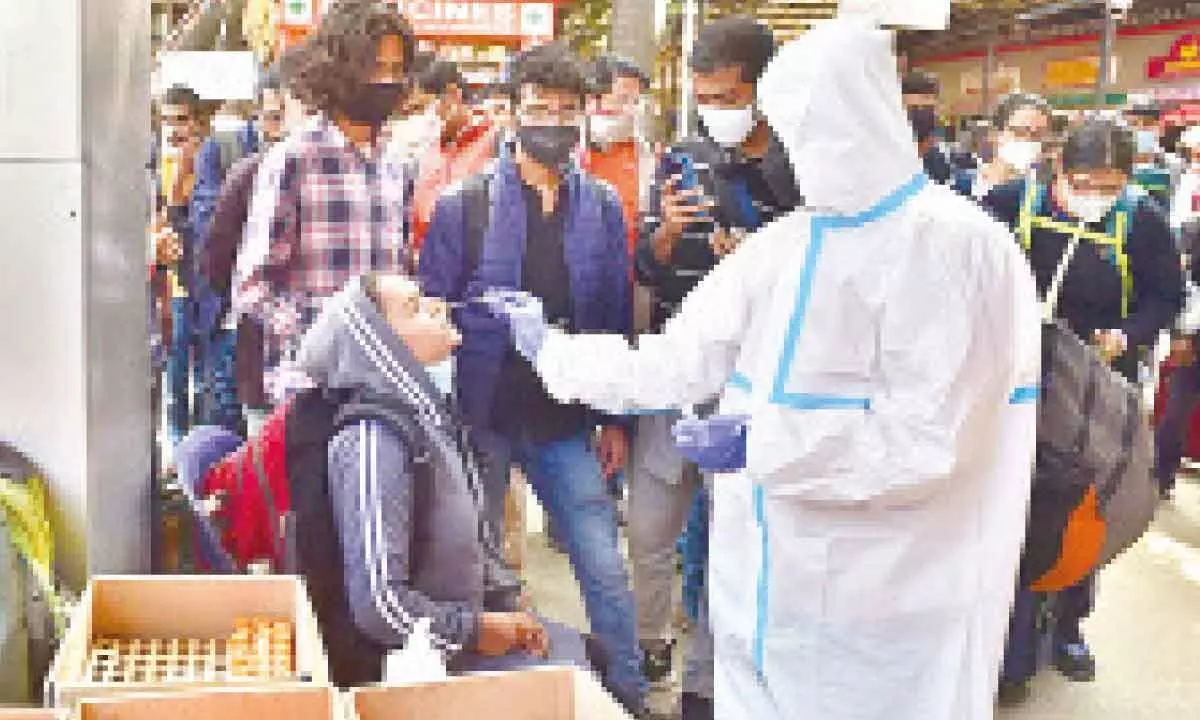Is Bengaluru rapidly turning into an 'infected' city?

70 % rise in viral infections, 25% influenza , 2 % Covid, 1 to 1.9 % H1N1 and 0.1% H3N2 in the last 2-3 weeks
Bengaluru: Karnataka, specifically Bangalore, is seeing a surge in viral infections for the past 2-3 weeks owing to changes in weather conditions and rising temperatures. At Narayana Health City alone, we have seen 50-100 Viral cases, 70 % normal viral infections, 25 % influenza A, about 2 % COVID, 1 to 1.9 % H1N1; on a daily case. We are also treating around 0.1% H3N2 cases. While these conditions are usually not fatal, however, as per health ministry data, two people have lost their life to H3N2 Influenza until now, says the Narayana Health City, Bangalore, Consultant - Internal Medicine, Dr. Nidhin Mohan.
Older adults and young children are at a higher risk. Cold, cough, fever, body pain and sour throat are the common symptoms and if anyone is exhibiting any of these, they should get themselves tested. People with other comorbidities like hypertension, BP, diabetes, asthma should be more careful. Due to virus mutation over the years, some of these symptoms are lasting for over 3 weeks. It is advisable to wear masks, eat healthy food, wash hands regularly and isolate to spread further if needed, said Dr. Nidhin Mohan.
BGS Gleneagles Global Hospital, Bengaluru, Director Infectious diseases, Dr Subramanian Swaminathan said, 'There has been raise in the respiratory viral infections all across India and its because of lot of different viruses all taking up same time which includes influenza both H1N1 and H3N2 in the big way but also to some extend Covid 19 and also not to forget things like adeno virus and RSV (Respiratory syncytial virus) so on. Generally winter season tends to be respiratory viral season perse although for us traditionally monsoon it can happen at this time to year.
'The interesting thing is the reason why there is been so much raise in respiratory viral infections over this winter is multi fold. One because we had new variant of influenza coming through therefore that is cause for lot more diseases. The second thing is that we have not had a flu season nearly for 3 years ever since Covid started. Therefore, we are kind of playing catch up. A new variant like HPV and all that coming through is because of respiratory infection now than over the last 6 months. With the onset of summer and raising temperature it is expected that these things will kind of reduce significantly very very soon' he added.
Aster CMI Hospital, Sr. Consultant - Internal Medicine, Dr. Bindumathi P L said, 'We have noticed a 70% rise in H3N2 which is an influenza virus among patients aged 25 and above. Flu, or seasonal influenza, is a viral infection that affects the nose, throat, and lungs. When an infected person sneezes or coughs, the virus can be transmitted, just like in Covid. Due to Bengaluru's hazardous weather fluctuations over the last one to two months, there is an abnormal pattern in the growth in the number of cases. Also, the symptoms are persisting longer than normal. You might call this a pattern we are now observing following Covid.
She added, 'New infections that require study could be one of the causes. Air pollution aggravates the respiratory symptoms of cough, wheeze, breathlessness. Another reason is that other viruses were ignored because of Covid, and they are now remerging. It is a self-limiting condition that results in illnesses of various degrees of severity with high fever, cough with sputum, breathlessness some of which require hospitalisation. The virus has the potential to cause a wide variety of symptoms, from moderate to severe, and consequences, particularly in vulnerable populations including the elderly and those with underlying medical issues. It is less severe than Covid, spreads through air'.
Depending on the patient, it often doesn't result in any issues and has a shorter isolation period than Covid. Being vaccinated is the greatest way to prevent influenza and minimise complications or spread.
The dose must be taken only once a year. Vaccination, basic hand hygiene, and avoiding direct contact with sick people are all part of prevention. These precautions can assist to stop the virus's spread and safeguard the wellbeing of our community.















